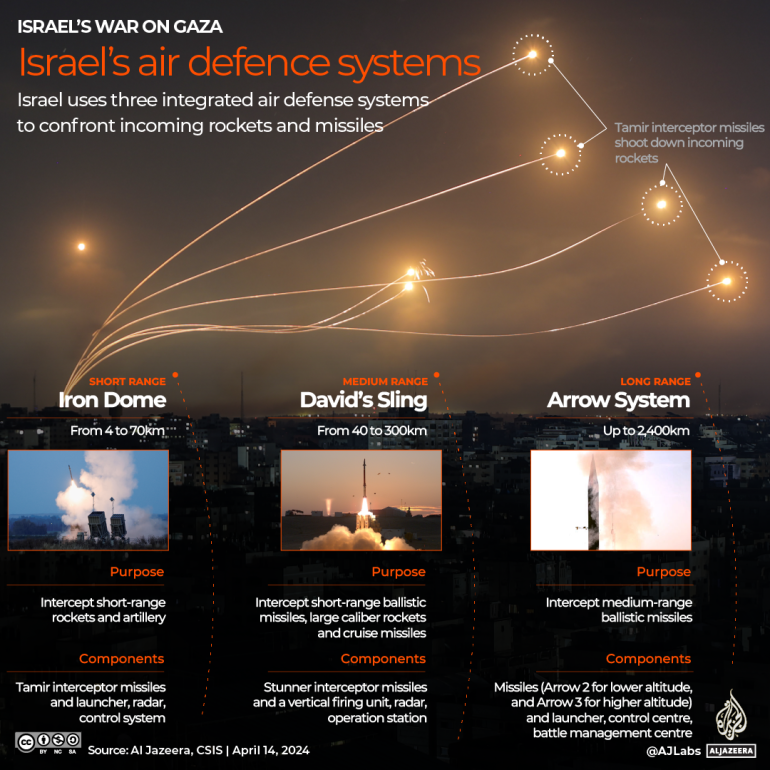Mapping 7,400 cross-border attacks between Israel and Lebanon

Tensions between Israel and the Lebanese group Hezbollah seem to be escalating as Israel’s war on Gaza nears nine months.
Since October 8, when Hezbollah launched attacks on Israel in solidarity with the Palestinian people, Israel has attacked it nearly four times as much, with more than 6,000 attacks along the 120km (75-mile) border.
Hezbollah, which was formed in 1982 to fight Israel’s invasion and occupation of southern Lebanon, says it will stop attacking Israel if its assault on Gaza stops.
In 2006, the group fought a 34-day war widely regarded as a strategic and military failure for Israel and its leader Hassan Nasrallah says they do not seek an expanded war but are prepared, backed by allies, to match Israel’s aggression.
Some Israeli leaders have pledged to remove Hezbollah from Lebanon’s south, even if by force.
The attacks
According to the Armed Conflict Location and Event Data Project (ACLED), Israel, Hezbollah and other armed groups in Lebanon exchanged at least 7,400 attacks across the border from October 7, 2023, to June 21, 2024.
Israel conducted about 83 percent of these attacks, totalling 6,142 incidents, killing at least 543 people in Lebanon.
Hezbollah and other armed groups were responsible for 1,258 attacks that killed at least 21 Israelis.
In addition to Hezbollah – which bore the brunt of the hostilities – other notable forces involved in attacks against Israel include the Lebanese al-Fajr Forces and Amal Movement, as well as Hamas’s Qassam Brigades and Palestinian Islamic Jihad’s al-Quds Brigades, both armed wings of Palestinian groups that maintain a presence in Lebanon.

Israel has attacked these locations in southern Lebanon the most:
- Aita al-Shaab – 300 attacks
- Ras al-Naqoura – 246 attacks
- Houla – 219 attacks
- Kfarchouba – 218 attacks
- Kfar Kila – 209 attacks
Groups from Lebanon attacked these locations in northern Israel the most:
- Kiryat Shmona – 132 attacks
- Margaliyot – 91 attacks
- Metula – 72 attacks
- Shetula – 64 attacks
- Manara – 64 attacks
Israel’s arsenal
Israel holds the most advanced missiles in the Middle East – many produced domestically – but most of its precision-guided missiles are from the United States.
According to the Center for Strategic and International Studies (CSIS), much of Israel’s capabilities are short-range tactical systems, including the Popeye, Extra and Gabriel missiles. Among its long-range missiles are Jericho 2 and Jericho 3 ballistic missiles, with ranges of 1,500-3,500km and 4,800-6,500km, respectively.
Also, despite not officially acknowledging it, Israel is believed to possess at least 90 nuclear weapons.

To confront incoming rockets and missiles, Israel uses three integrated air defence systems: the Iron Dome (short-range), David’s Sling (medium-range) and Arrow (long-range).
The Iron Dome was originally billed as providing city-sized coverage against rockets with ranges between 4km and 70km (2.5 to 43 miles), but experts say this has been expanded.
David’s Sling, produced by Israeli weapons giant Rafael, can intercept rockets and missiles with a range of 40-300km (25-186 miles). The Arrow series, led by the Arrow 3 interceptor, has an estimated flyout range of up to 2,400km (1,491 miles).

Hezbollah’s arsenal
Hezbollah is considered to be one of the world’s most heavily armed non-state actors with a rocket arsenal estimated to contain 130,000 pieces, according to CSIS.
On October 19, Israel’s Institute for National Security Research published estimates of Hezbollah’s arsenal of missiles and drones. Hezbollah, it said, had 40,000 grad-type missiles, with a short range of 15-20km (9-12 miles).
A step up are 80,000 longer-range missiles, including the Fajr 3 and Fajr 5 ballistic missiles, with a range of 100km (62 miles).
Finally, there are about 30,000 Zelzal or Fateh-110 missiles with a range of 200-300km (124-186 miles) – the longest-ranged weapons in Hezbollah’s inventory capable of reaching southern Israel.

Related
Qatar emphasizes importance of reaching agreement between US, Iran
CAIROQatar's Prime Minister Sheikh Mohammed bin Abdulrahman Al-Thani stressed the critical need for an agreement between the US and
International Women’s Day: Seeking a Balance with Ghada Al Subaey
1309’s Ghada Al Subaey of Qatar celebrates the many layers of femininity in her recent drop, called Labyrinth of Light. This International Women’s Day, the
Discover Ooredoo Plans and Services in Qatar
Ooredoo is the household name in the field of telecommunications and provides a full portfolio of telecom services: mobile plans for everyone, home
What Will The Imminent Qatar Airways Widebody Order Include?
Which Airline Alliance Do You Prefer To Fly With?












